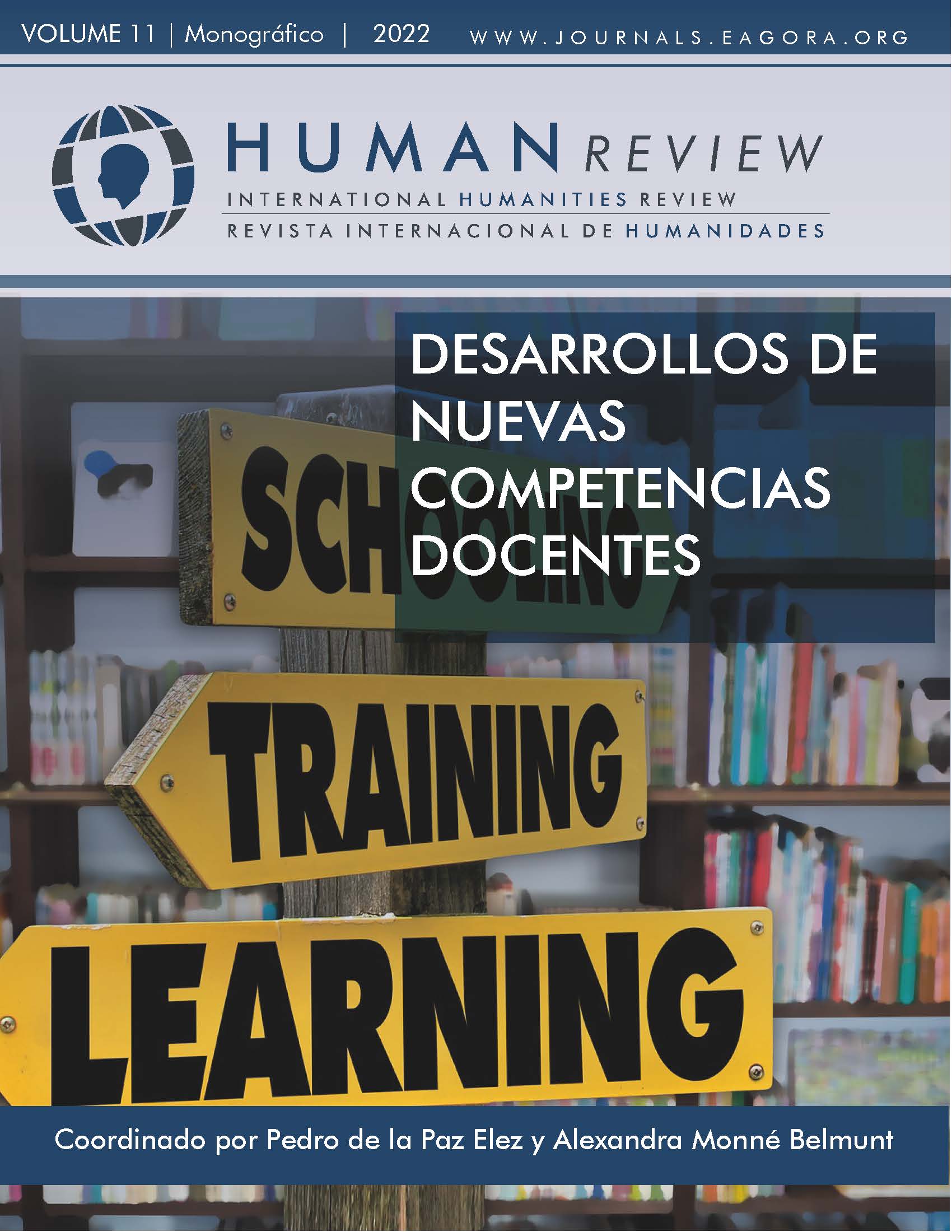Expectativas en torno a Big Data
La voz de profesores y estudiantes de educación superior
DOI:
https://doi.org/10.37467/revhuman.v11.3840Palavras-chave:
Procesamiento de datos, Big Data, Educación Superior, Formación Profesional, Orientación profesionalResumo
Los datos se han convertido en un elemento significativo para comprender el comportamiento de diversos sistemas. En este contexto, Big Data es un concepto que hace referencia al trabajo con grandes volúmenes de datos y con una frontera difusa entre análisis y gestión de ellos. Con tal objeto, esta investigación se enmarca en el paradigma cualitativo. Mediante entrevistas a estudiantes y profesores, partícipes de un curso introductorio a Big Data, busca develar la utilidad en torno a esta temática. Los principales hallazgos constatan una divergencia entre el concepto y lo que se entiende de él.
Referências
Al Jafari, A., Zakir, S. y Dattana, V. (2019). The growing demand for Big-Data Analytics. International Journal of Information and Computing Science. 6(5), 621 - 626.
Althusser, L. (1970). Ideología y aparatos ideológicos del estado. Quinto sol.
Bennell, P. (1996). Using and abusing rates of return: A critique of the World Bank’s 1995 Education Sector Review. International journal of educational development, 16(3), 235-248. https://doi.org/10.1016/0738- 0593(96)00016-8
Anshari, M., Alas, Y. y Guan, L. (2016). Developing online learning resources: Big Data, social networks, and cloud computing to support pervasive knowledge. Education and Information Technologies, 21(6), 1663- 1677. https://doi.org/10.1007/s10639-015-9407-3
Bonal, X. (2002). Globalización y política educativa: un análisis crítico de la agenda del Banco Mundial para América Latina (Globalization and Education Policy: A Critical Analysis of the World Bank‘s Agenda for Latin America). Revista mexicana de sociología, 3-35.
Bowles, S. y Gintis, H. (1981). La instrucción escolar en la América Capitalista. Siglo XXI.
Cao, S. (2021, march). Opportunities and Challenges of Marketing in the Context of Big Data. En 2021 Workshop on Algorithm and Big Data (pp. 79-82).
Cukier, K. y Mayer-Schönberger, V. (2013). The Rise of Big Data: How It’s Changing the Way We Think About the World. Foreign Affairs, 28 - 40.
Dede, C. J. (2016). Next steps for “Big Data” in education: Utilizing data-intensive research. Educational Technology.
Recuperado de https://bit.ly/31ZiEwK
Enterprise Strategy Group (2021). Technology Spending Intentions Survey 2021. Recuperado de: https://rebrand. ly/m92z2x7
Espinoza, O. (2017). Neoliberalismo y educación superior en Chile: una mirada crítica al rol desempeñado por el Banco Mundial y los “Chicago Boys”. Laplage em revista, 3(3), 93-114.
Heyneman, S. P. (2003). The history and problems in the making of education policy at the World Bank 1960– 2000. International journal of educational development, 23(3), 315-337.
Heyneman, S. P. (1997). Economic growth and the international trade in educational reform. Prospects, 27(4), 501-530. https://doi.org/10.1007/BF02736595
Hilbert, M. (2016). Big Data for Development: A Review of Promises and Challenges. Development Policy Review, 34(1), 135-174. https://doi.org/10.1111/dpr.12142
Joyanes, L. (2013). Big Data: análisis de grandes volúmenes de datos en organizaciones. México D F : Alfaomega.
Joyanes, L. (2019). Inteligencia de Negocios y Analítica de Datos: Una visión global de Business Intelligence & Analytics. Alfaomega.
Kempner, K. y Loureiro, A. (2002). The global politics of education: Brazil and the World Bank. Higher Education, 43(3), 331-354.
Lauglo, J. (1996). Banking on education and the uses of research. A critique of: World Bank priorities and strategies for education. International journal of educational development, 16(3), 221-233. https://doi. org/10.1016/0738-0593(96)00015-6
Linstone, H. y Turoff, M. (1975). The Delphi method, techniques and applications. Addison Wesley publishing. Long, P. y Siemens, G. (2011, September 12). Penetrating the Fog: Analytics in Learning and Education. EduCause
Review, 46(5), 6.
López-Núñez, J. y Cerda-Neumann, G. (2022). Redefiniendo Big Data: una propuesta desde la Academia. En Mediaciones Comunicativas, Thomson Reuters-Aranzadi.
Maldonado, A. (2000). Los organismos internacionales y la educación en México: El caso de la educación superior y el Banco Mundial. Perfiles educativos, 22(87), 51-75.
NewVantage Partners (2022). Data and AI leadership executive survey 2022. Recuperado de: https://rebrand.ly/ hgz4alr
Okoli, C. y Pawlowski, S. D. (2004). The Delphi method as a research tool: an example, design considerations and applications. Information & Management, 15 – 29. https://doi.org/10.1016/j.im.2003.11.002
Psacharopoulos, G. (1973). Returns to Education: An International Comparison. Elsevier Scientific Publishing. Rezaee, Z. y Wang, J. (2017). Relevance of Big Data to Forensic Accounting Practice and Education: Insight from
China. 7th Annual International Conference on Accounting and Finance, (Af), 103-110.
Sledgianowski, D., Gomaa, M. y Tan, C. (2017). Toward integration of Big Data, technology and information systems competencies into the accounting curriculum. Journal of Accounting Education, 38, 81-93. https://doi. org/10.1016/j.jaccedu.2016.12.008
Tekdogan, T. y Cakmak, A. (2021, august). Benchmarking Apache Spark and Hadoop MapReduce on Big Data Classification. En 2021 5th International Conference on Cloud and Big Data Computing (ICCBDC) (pp. 15-20).
Tójar, J. y Serrano, J. (2000). Ética e investigación educativa. Revista electrónica de investigación y evaluación Educativa. 6(2).
Waller, M. y Fawcett, S. (2013). Data Science, Predictive Analytics, and Big Data: A Revolution That Will Transform Supply Chain Design and Management. Journal of Business Logistics, 34(2), 77-84. https://doi. org/10.1111/jbl.12010
Zheng, Z. (2021, december). Application Analysis of Hadoop in Big Data Processing. En 2021 International Conference on Aviation Safety and Information Technology (pp. 405-408)
Downloads
Publicado
Como Citar
Edição
Seção
Licença
Os autores/as que publicam nesta revista concordam com os seguintes termos:
- Os autores/as terão os direitos morais do trabalho e cederão para a revista os direitos comerciais.
- Um ano após a sua publicação, a versão do editor estará em acesso aberto no site da editora, mas a revista manterá o copyright da obra.
- No caso dos autores desejarem asignar uma licença aberta Creative Commons (CC), poderão a solicitar escrevendo a publishing@eagora.org.









